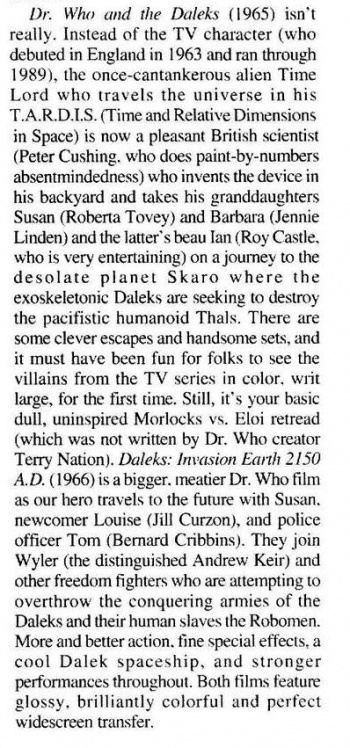Difference between revisions of "Dr. Who and the Daleks (1965) isn't really"
John Lavalie (talk | contribs) (Created page with "{{article | publication = Science Fiction Chronicle | file = 2002-02 Science Fiction Chronicle.jpg | px = 350 | height = | width = | date = 2002-02-01 | display date = Febru...") |
John Lavalie (talk | contribs) m (Text replace - "Thais" to "Thals") |
||
| Line 17: | Line 17: | ||
| moreDates = | | moreDates = | ||
| text = | | text = | ||
| − | Dr. Who and the Daleks (1965) isn't really. Instead of the TV character (who debuted in England in 1963 and ran through 1989), the once-cantankerous alien Time Lord who travels the universe in his T.A.R.D.I.S. (Time and Relative Dimensions in Space) is now a pleasant British scientist (Peter Cushing. who does paint-by-numbers absentmindedness) who invents the device in his backyard and takes his granddaughters Susan (Roberta Tovey) and Barbara (Jennie Linden) and the latter's beau Ian (Roy Castle. who is very entertaining) on a journey to the desolate planet Skaro where the exoskeletonic Daleks are seeking to destroy the pacifistic humanoid | + | Dr. Who and the Daleks (1965) isn't really. Instead of the TV character (who debuted in England in 1963 and ran through 1989), the once-cantankerous alien Time Lord who travels the universe in his T.A.R.D.I.S. (Time and Relative Dimensions in Space) is now a pleasant British scientist (Peter Cushing. who does paint-by-numbers absentmindedness) who invents the device in his backyard and takes his granddaughters Susan (Roberta Tovey) and Barbara (Jennie Linden) and the latter's beau Ian (Roy Castle. who is very entertaining) on a journey to the desolate planet Skaro where the exoskeletonic Daleks are seeking to destroy the pacifistic humanoid Thals. There are some clever escapes and handsome sets, and it must have been fun for folks to see the villains from the TV series in color, writ large, for the first time. Still, it's your basic dull, uninspired Morlocks vs. Eloi retread (which was not written by Dr. Who creator Terry Nation). Daleks: Invasion Earth 2150 A.D. (1966) is a bigger. meatier Dr. Who film as our hero travels to the future with Susan. newcomer Louise (Jill Curzon), and police officer Tom (Bernard Cribbins). They join Wyler (the distinguished Andrew Keir) and other freedom fighters who are attempting to overthrow the conquering armies of the Daleks and their human slaves the Robomen. More and better action. tine special effects, a cool Dalek spaceship, and stronger performances throughout. Both films feature glossy, brilliantly colorful and perfect widescreen transfer. |
}} | }} | ||
Latest revision as of 00:05, 25 June 2019
- Publication: Science Fiction Chronicle
- Date: February 2002
- Author: Jeff Rovin
- Page: 29
- Language: English
Dr. Who and the Daleks (1965) isn't really. Instead of the TV character (who debuted in England in 1963 and ran through 1989), the once-cantankerous alien Time Lord who travels the universe in his T.A.R.D.I.S. (Time and Relative Dimensions in Space) is now a pleasant British scientist (Peter Cushing. who does paint-by-numbers absentmindedness) who invents the device in his backyard and takes his granddaughters Susan (Roberta Tovey) and Barbara (Jennie Linden) and the latter's beau Ian (Roy Castle. who is very entertaining) on a journey to the desolate planet Skaro where the exoskeletonic Daleks are seeking to destroy the pacifistic humanoid Thals. There are some clever escapes and handsome sets, and it must have been fun for folks to see the villains from the TV series in color, writ large, for the first time. Still, it's your basic dull, uninspired Morlocks vs. Eloi retread (which was not written by Dr. Who creator Terry Nation). Daleks: Invasion Earth 2150 A.D. (1966) is a bigger. meatier Dr. Who film as our hero travels to the future with Susan. newcomer Louise (Jill Curzon), and police officer Tom (Bernard Cribbins). They join Wyler (the distinguished Andrew Keir) and other freedom fighters who are attempting to overthrow the conquering armies of the Daleks and their human slaves the Robomen. More and better action. tine special effects, a cool Dalek spaceship, and stronger performances throughout. Both films feature glossy, brilliantly colorful and perfect widescreen transfer.
Disclaimer: These citations are created on-the-fly using primitive parsing techniques. You should double-check all citations. Send feedback to whovian@cuttingsarchive.org
- APA 6th ed.: Rovin, Jeff (February 2002). Dr. Who and the Daleks (1965) isn't really. Science Fiction Chronicle p. 29.
- MLA 7th ed.: Rovin, Jeff. "Dr. Who and the Daleks (1965) isn't really." Science Fiction Chronicle [add city] February 2002, 29. Print.
- Chicago 15th ed.: Rovin, Jeff. "Dr. Who and the Daleks (1965) isn't really." Science Fiction Chronicle, edition, sec., February 2002
- Turabian: Rovin, Jeff. "Dr. Who and the Daleks (1965) isn't really." Science Fiction Chronicle, February 2002, section, 29 edition.
- Wikipedia (this article): <ref>{{cite news| title=Dr. Who and the Daleks (1965) isn't really | url=http://cuttingsarchive.org/index.php/Dr._Who_and_the_Daleks_(1965)_isn%27t_really | work=Science Fiction Chronicle | pages=29 | date=February 2002 | via=Doctor Who Cuttings Archive | accessdate=5 December 2025 }}</ref>
- Wikipedia (this page): <ref>{{cite web | title=Dr. Who and the Daleks (1965) isn't really | url=http://cuttingsarchive.org/index.php/Dr._Who_and_the_Daleks_(1965)_isn%27t_really | work=Doctor Who Cuttings Archive | accessdate=5 December 2025}}</ref>
